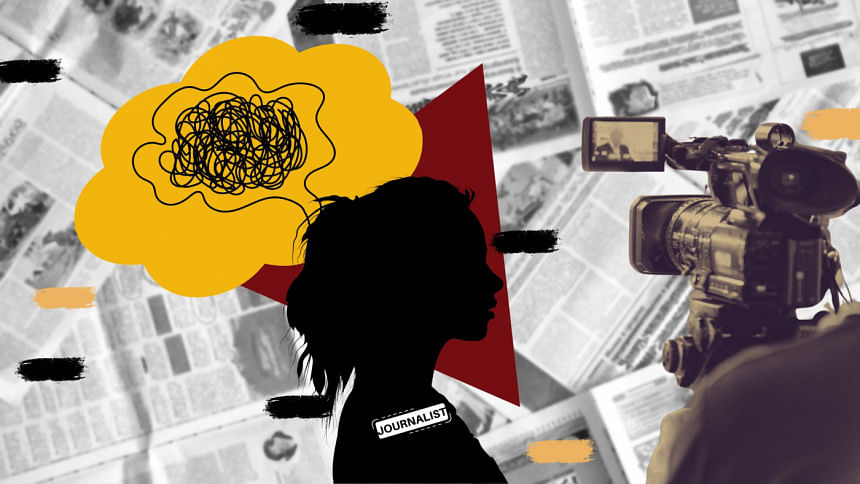Time for journalists to speak up about their mental health

The historic student-led mass uprising that toppled the almost 16-year-long Sheikh Hasina regime has left a grave mark of trauma behind. Violent clashes before and after the event claimed more than a thousand lives. Journalists on the fields suffered blows from both sides of the movement—the security forces and the protesters. At least four journalists died and many more were injured. Apart from physical assault, journalists had to witness violent clashes, people being shot and killed, lynching and aggravated mob activities. Many journalists are still suffering from post-traumatic stress disorder (PTSD), anxiety, depression and other mental disorientation.
Although journalists constantly deal with stressful situations, they seldom seek help. There exists a great deal of stigma around mental health. A common misconception is seeking help might make them look vulnerable and unfit to perform their jobs. Lack of support within their organisations and the journalist community as a whole is also an issue. The media industry is notorious for its demanding schedules, high-stress levels, and exposure to traumatic events, which clearly takes a toll on mental health.
Though mental health is recognised as important as physical health all over the world, most people, including journalists, often ignore mental health due to a lack of knowledge and awareness. Mar Cabra worked as data editor at the International Consortium of Investigative Journalists (ICIJ). Shortly after she won a Pulitzer Prize with her team for their reporting on the Panama Papers, she experienced burnout, forcing her to quit journalism altogether. As she recovered, she co-founded The Self-Investigation, an organisation that hopes to promote a healthier way of working in newsrooms around the world.
In an interview, Mar said, studies have shown that managers have as much of an impact on people's mental health as their spouses. So as a manager, it's important to acknowledge that they have a big responsibility, which is to recognise the signs when team members are not doing well.
In recent years, the mental health of journalists has become a concern for many countries, especially the ones that are engaged in war, conflict, violence or any natural disaster. Journalism is a challenging job, and it is more so for female journalists who are expected to contribute at home as well.
Though still lower in numbers than their male counterparts, female journalists in Bangladesh play a vital role in disseminating news, sharing stories, and representing diverse perspectives. Their work is critical for democracy and social progress, but it often comes at a high personal cost. Female journalists face additional and unique challenges, such as gender-based discrimination both in the newsroom and in the field—harassment, unequal pay, limited opportunities for career advancement and cultural expectations that can exacerbate these pressures. Despite significant progress in recent years, gender disparities in the news industry persist in Bangladesh. These challenges can lead to frustration, stress, anxiety and burnout. As a result, many promising female journalists often leave this profession.
Recognising the importance of addressing the mental health needs of female journalists in Bangladesh, Media Resources Development Initiative recently organised a training for female journalists. Five experienced female journalists were selected and a professional psycho-counsellor trained them so that they can work as para-counselors (empathetic listeners) for their peers. After the training the five journalists along with the counsellor were introduced to 71 other female journalists.
Through this intervention, female journalists shared their experiences and how they dealt with problems at work. The newsroom environment in Bangladesh is often very toxic and stressful for women. Male colleagues often exert authority through humiliation and stereotyping. The misogynistic tendencies and latent sexual harassment have been so internalised that they mostly go unaddressed.
Women journalists are subjected to discrimination by the news managers, who are mostly males. They are not given enough space in decision-making, and their opinion is ignored when important decisions are made. Even when they face any complication and complain about that, their voices remain unheard.
A regular newsroom in Bangladesh has a highly tense environment usually with no breathing space and no common area for women to chit-chat with peers. Male journalists often manage to create such a space as they gather for a smoke. And the smoking zones become an important place to vent out their frustrations. Sometimes, important decisions are taken in smoking zones. Women are usually excluded from such spaces. Moreover, a female journalist always has to prove her worth twice.
Female journalists face more struggles at home too. As she has a career that demands more time and concentration than any other job, it affects personal relationships as well.
Parenting duties are already quite hard on modern women. There are more nuclear families now, where both parents work and they are the only caregiver. Most news outlets do not have a daycare facility for the children and thus the mother is burdened with parental responsibilities.
Online harassment is also becoming a major threat to female journalists. They are being targeted for their stories or looks on social media, even for their posts, comments or views. Sometimes disturbing contents are distributed through social media groups or messaging apps to harass female journalists. They often are vulnerable to excessive trolling.
Another concern affecting mental health is the lack of job security and low pay. Journalists in general suffer grave anxiety regarding their jobs. The salary scale is quite low compared to other white-collar jobs.
Many of the journalists who participated in the intervention felt relieved just by sharing their experiences. They found meditation, breathing exercises and tools to heal trauma liberating. Some of the attendees reached out later for more support.
Returning to the event of August 5, the para counselors received several phone calls from both male and female journalists who shared the traumatic incidents they experienced. Apart from all the blood and gore, there were also disturbing incidents of bullying for wearing a tip (a decorative dot on the forehead) while walking on the street. A compassionate conversation over warm coffee proved to be healing. Professional counselling from a trained psycho-counselor is also being provided when required. Besides, there are hopes to extend the initiative to provide regular support for the journalists. There are hopes too of collaboration with news outlets to address the issue of journalists' mental health.
Nadia Sarwat works as gender focal at Media Resources Development Initiative.
Views expressed in this article are the author's own.
Follow The Daily Star Opinion on Facebook for the latest opinions, commentaries and analyses by experts and professionals. To contribute your article or letter to The Daily Star Opinion, see our guidelines for submission.

 For all latest news, follow The Daily Star's Google News channel.
For all latest news, follow The Daily Star's Google News channel. 










Comments